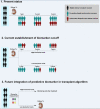Pretransplant characteristics of kidney transplant recipients that predict posttransplant outcome
- PMID: 35958571
- PMCID: PMC9357871
- DOI: 10.3389/fimmu.2022.945288
Pretransplant characteristics of kidney transplant recipients that predict posttransplant outcome
Abstract
Better characterization of the potential kidney transplant recipient using novel biomarkers, for example, pretransplant plasma endotrophin, will lead to improved outcome after transplantation. This mini-review will focus on current knowledge about pretransplant recipients' characteristics, biomarkers, and immunology. Clinical characteristics of recipients including age, obesity, blood pressure, comorbidities, and estimated survival scores have been introduced for prediction of recipient and allograft survival. The pretransplant immunologic risk assessment include histocompatibility leukocyte antigens (HLAs), anti-HLA donor-specific antibodies, HLA-DQ mismatch, and non-HLA antibodies. Recently, there has been the hope that pretransplant determination of markers can further improve the prediction of posttransplant complications, both short-term and long-term outcomes including rejections, allograft loss, and mortality. Higher pretransplant plasma endotrophin levels were independently associated with posttransplant acute allograft injury in three prospective European cohorts. Elevated numbers of non-synonymous single-nucleotide polymorphism mismatch have been associated with increased allograft loss in a multivariable analysis. It is concluded that there is a need for integration of clinical characteristics and novel molecular and immunological markers to improve future transplant medicine to reach better diagnostic decisions tailored to the individual patient.
Keywords: acute allograft injury; biomarker; endotrophin; immunology; kidney transplantation; potential kidney transplant recipient; precision transplant medicine; rejection.
Copyright © 2022 Tepel, Nagarajah, Saleh, Thaunat, Bakker, van den Born, Karsdal, Genovese and Rasmussen.
Conflict of interest statement
MAK, FG, and DGKR are full-time employees at Nordic Bioscience. Nordic Bioscience is a privately-owned, small–medium size enterprise partly focused on the development of biomarkers. None of the authors received fees, bonuses or other benefits for the work described in the review. MAK, FG, and DGKR hold stocks in Nordic Bioscience. The remaining authors declare that the research was conducted in the absence of any commercial or financial relationships that could be construed as a potential conflict of interest.
Figures

References
-
- Danovitch GM. ed. Handbook of kidney transplantation. 4th ed. Philadelphia: Lippincott, Williams & Wilkins; (2005).
-
- Raynaud M, Aubert O, Divard G, Reese PP, Kamar J, Yoo D, et al. . Dynamic prediction of renal survival among deeply phenotyped kidney transplant recipients using artificial intelligence: an observational, international, multicohort study. Lancet Digit Health (2021) 3:e795–805. doi: 10.1016/S2589-7500(21)00209-0 - DOI - PubMed
Publication types
MeSH terms
Substances
LinkOut - more resources
Full Text Sources
Other Literature Sources
Medical
Research Materials

